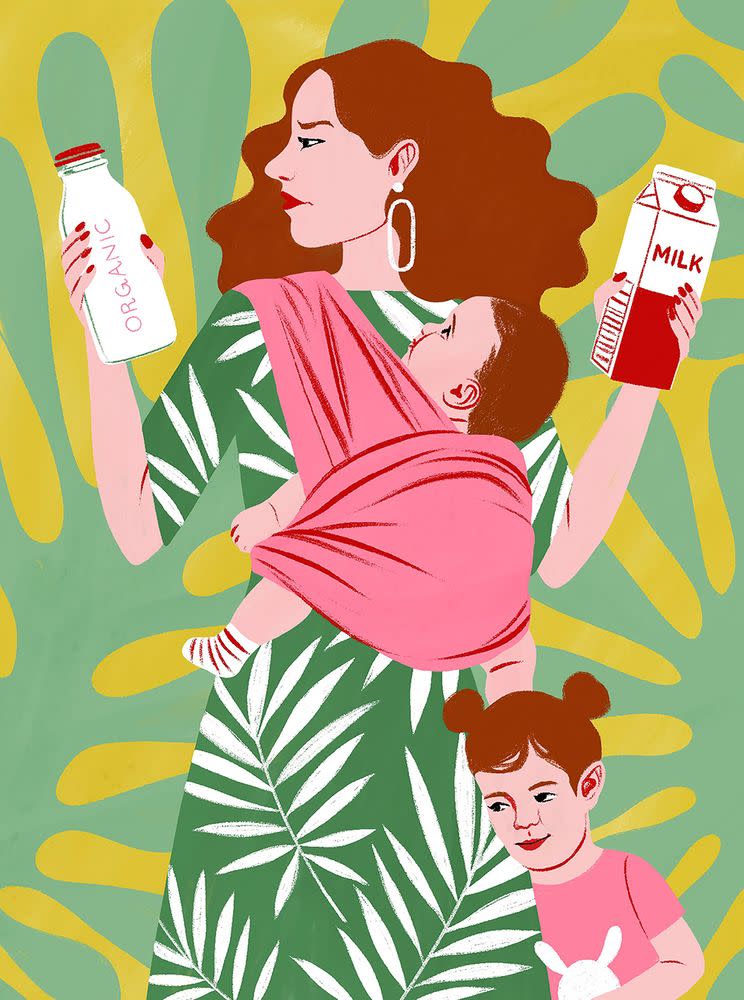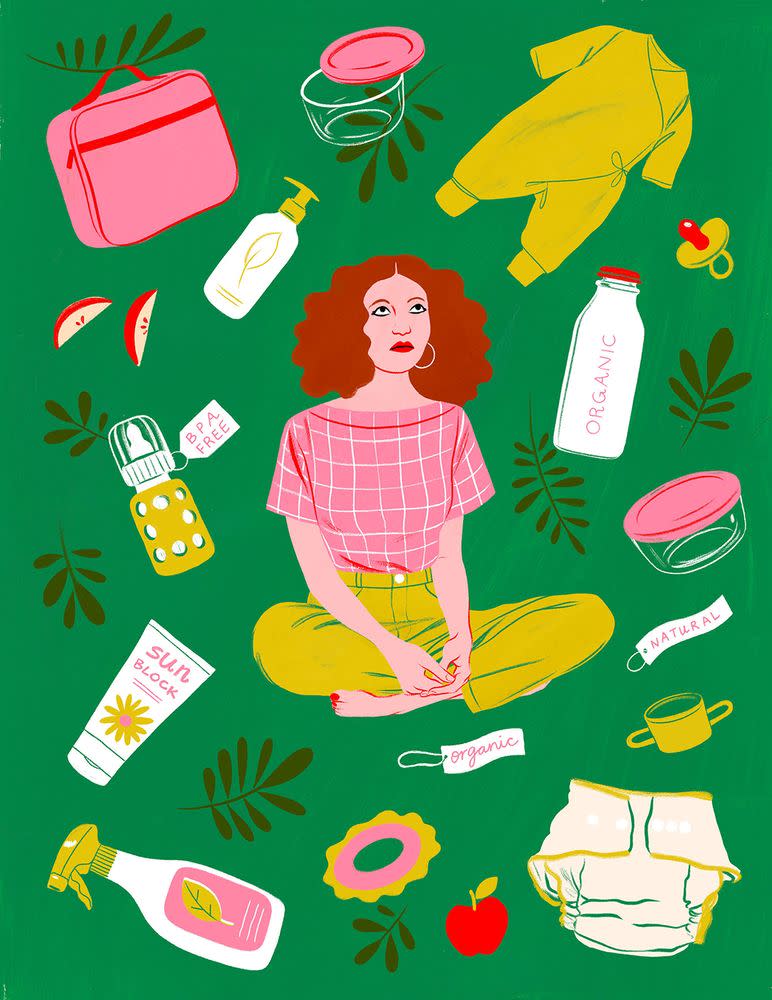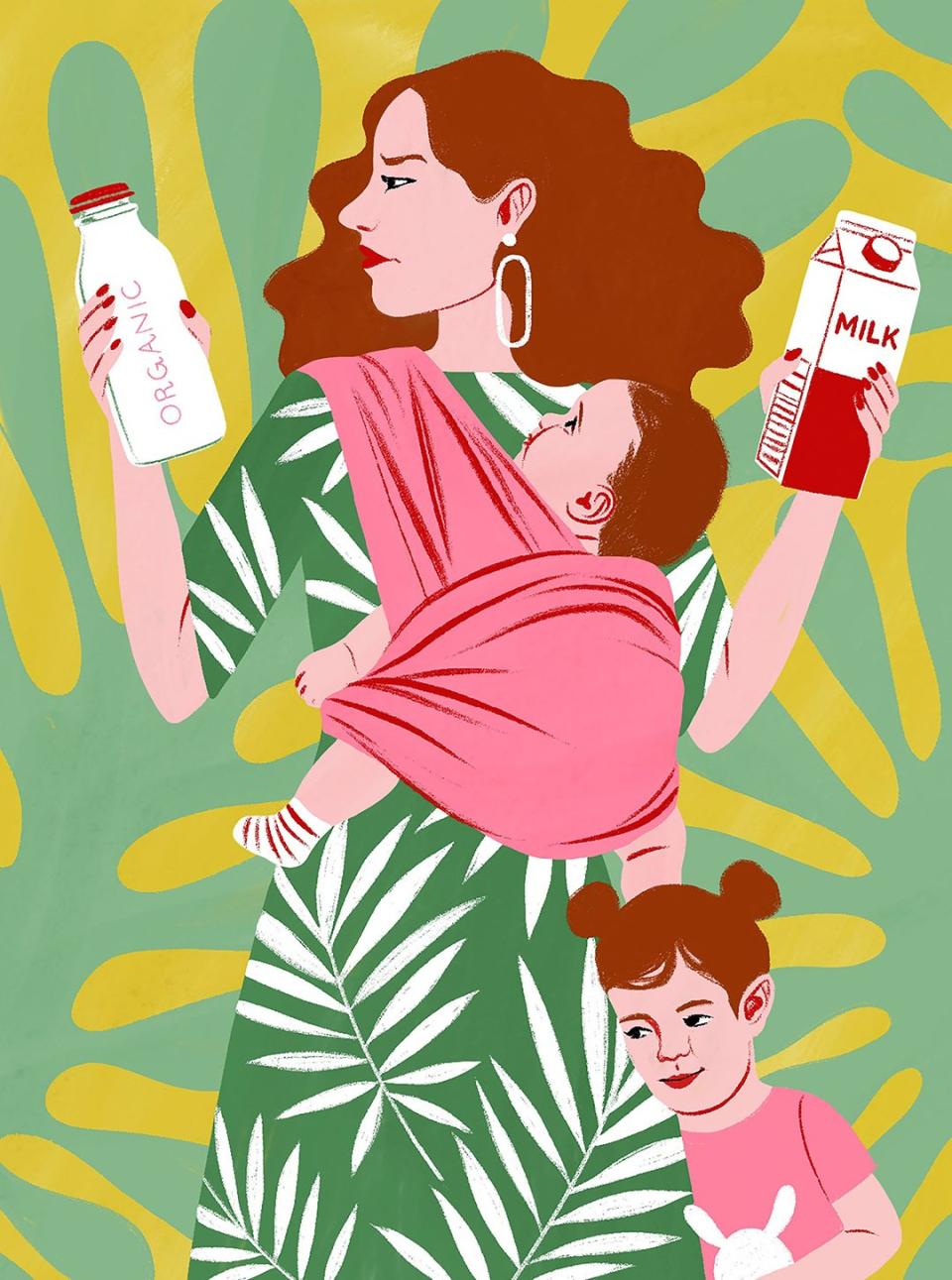How I'm Raising Eco-Friendly Kids On My Own Terms

Before I had kids, I had big plans. Breastfeeding, of course. Cloth diapers, absolutely. Only stainless-steel or glass bottles, sippy cups, and plates. Cleaning supplies made from white vinegar, lemon, and essential oils. The list goes on and on. Here’s the real confession: I didn’t just plan on doing these things myself. As an environmental-health journalist, I’d spent years writing articles about why other parents should do this stuff too. (Some of those stories were published right here in this very magazine!) Let me repeat: I wrote them before I had kids and, frankly, had no idea how hard it would be to clean spit-up stains with baking soda or pack zero-waste lunch boxes with only organic homemade meals.
The reality check set in fast. When I got pregnant, my husband talked me out of cloth diapers in my first trimester. And when our daughter struggled to learn how to drink out of a cup, I realized I was perfectly happy for her to eschew the stainless-steel one for another that was not just plastic but had clear sides containing tiny mermaids floating in some kind of surely toxic blue glitter gel.
During my second pregnancy, I gave up composting and vegetable gardening. (I got heartburn every time I bent over, so forget harvesting radishes.) And my town has probably had to open a new landfill to contain all the disposable diapers, wipes, and snack bags my family has thrown away in the past five years. We do still mostly use rags instead of paper towels, buy organic milk, and try to eat only sustainably raised meat. But when our house gets a stomach bug, we break out the bleach.
Sometimes I wonder what happened to that person who was so sure she could parent 100 percent sustainably. Have I let the daily stresses of motherhood compromise who I am? But when I survey my like-minded mom friends, I realize we’re all relaxing some of the “natural parenting” rules. One mom cloth-diapered her way through two babies but is now expecting #3 and ordering Pampers in bulk. Another broke up with organic-yogurt tubes when she realized that the far cheaper conventional brand was no different, nutritionwise. KJ Dell’Antonia, a mom of four and author of How to Be a Happier Parent, says that her tipping point was glass milk bottles: “I really wanted to buy my kids’ milk from a local farm that uses glass bottles, and I did for a while,” she recalls. “But the third time one of those bottles fell and broke on my garage floor while I was unloading groceries with kids underfoot, I went back to plastic containers.”
These choices aren’t about selling out. We’re just done trying to live up to the unrealistic standards developed in the 1970s by crunchy-parenting idols such as William Sears, M.D., and perpetuated these days by blogs like Genevieve Howland’s Mama Natural and Vana Hari’s Food Babe. Many green practices involve simple, easy swaps, but trying to Do It All Naturally creates more work, costs us more money, and makes us feel like we’ve failed for not being some perfect paragon of natural parenting. That said, we still care deeply about the planet. So ... now what?

The Kids Are All Right
First of all, let’s deal with our fear about failing on the natural front. Most of us look for labels like “natural” and “organic” because we’re sure that foods and products identified that way will be safer for our kids. We know that babies and small children ingest lots of pesticides and other trace chemicals that show up in dirt and dust because they spend a lot of time close to the ground. Nobody wants their baby bathing in carcinogens.
But these marketing terms don’t necessarily guarantee safer alternatives. “Natural,” in particular, has no legal definition. We don’t have comprehensive chemical-safety regulations in this country, so manufacturers are largely on the honor system when it comes to determining the safety of their ingredients. That means we can’t breathe a sigh of relief by choosing organic-cotton crib sheets or BPA-free teething rings. There are just too many exposure sources, and you can’t whack-a-mole them all.
RELATED: Should You Buy Organic?
The good news is that while the health risks of chemicals in our consumer goods are real, they are also small. Take food: “Pesticide exposure is a big concern, but organic farmers can use certain types of pesticides as well that may not be much safer,” says Nina Shapiro, M.D., the director of pediatric otolaryngology at the University of California, Los Angeles, and coauthor of Hype: A Doctor’s Guide to Medical Myths, Exaggerated Claims, and Bad Advice. “Plus, there’s no real evidence that organic food is healthier for kids in terms of nutritional content.” So it’s important to spot the marketing hype. “A conventionally grown apple is a cheaper and healthier choice than an organic-applesauce pouch because it doesn’t have added sugar or packaging,” Dr. Shapiro says. (But please note that I’m not guilt-tripping you if your kids love organic-applesauce pouches. You just don’t have to buy them to please the natural-parenting gods!)
Spot the Sexism
My biggest gripe about most natural-parenting mandates is that they make more work for moms. Since women still clock more hours doing child care and domestic labor than men, guess what happens when one of those jobs gets more time-consuming or requires more research to figure out the safest, most natural way to get it done? Mama’s to-do list gets longer, and she sleeps less.
“Making your own baby food and shopping for the ‘best’ baby products takes lots of time,” says Lindsay Powers, a mom of two and founder of the #NoShameParenting movement. “If we can make that time commitment, it’s a way to prove that we can ‘have it all.’ But we may not even want all these things. What we really want is to create a life that works for us and our family.”
Making a pitch for 50-50 parenting is actually how my husband talked me out of cloth diapering; he wanted to change his fair share of diapers but did not want our laundry to triple. I knew our family would be better off with a dad who did laundry, so we had to find an approach that would work for both of us.
Still, many in the natural-parenting movement identify as feminists. They argue that we deserve more support and empowerment throughout pregnancy, childbirth, and breastfeeding than we have historically gotten from the male-dominated medical world. Yes. Preach. But telling women they must do something the most natural way no matter what, whether that’s skipping an epidural or breastfeeding exclusively, isn’t empowering us to make our own choices either. “Women are starting to stand up to these unrealistic expectations,” says Powers, who points to the rising popularity of the #FedIsBest campaign, which empowers mothers to make their own choices about the best way to feed their babies. The group's hashtag has more than 115,000 mentions on Instagram.
As we push back against these double standards, it’s also important to recognize those times when we’re making things harder for ourselves. Natural parenting, with its many rules and studies and lists of ingredients to memorize and analyze, can feel like a hugely important project to take on. Of course, protecting the environment is important, but it’s also not a problem we can fix just by shopping our way out of it or cooking all our meals from scratch. Making small changes when they make sense and don’t create a lot of stress is one thing. Feeling like we’re single-handedly failing the planet and our children is a sign that we’ve lost the plot.
Do Your Own Thing
As the natural-parenting movement has gotten bigger and crazier, its messages have become more diffuse. So let’s step back: What does your decision on painkillers during childbirth have to do with how you feed your baby or what kind of sippy cup you buy? Sometimes we just need to remind ourselves that these are discrete choices, and opting in for one shouldn’t require us to opt in for all of them.
I struggled with that (perfectionist alert!) because I wanted to feel I was doing everything right, and I really do care about protecting our health and the environment. So if this stuff does matter to you, how can you commit to the cause without making yourself crazy? “You pick your priority, and I’ll pick mine,” says Dell’Antonia. “Maybe you decide to stick with glass milk bottles or cloth diapers or homemade baby food. Then you can give yourself a break on all the rest.”
And in committing to one goal, keep in mind that you also reserve the right to switch goals if your choice stops serving you. “You can do a little bit of everything!” says Powers. “I’ve used formula, and I’ve breastfed. You can make your own baby-food purees and buy the premade pouches when you find them on sale.”
I’m a big fan of this “do it until it stops working” approach. I had a drug-free childbirth the first time and an extremely drug-filled delivery the second time. At the moment, I’m oddly enjoying the challenge of packing zero-waste lunch boxes for my elder daughter (while also throwing out many used diapers and baby-formula cans every week). But if she decides she wants to buy lunch at school—or if I get really sick of washing reusable sandwich bags every night—I’ll trade that in for greener cleaning products, or I’ll make more of an effort to use hand-me-downs for my girls instead of buying new. Heck, maybe I’ll even revive the vegetable garden.
And for everything you choose not to do, Dell’Antonia says, the key is to make sure you also choose not to worry about it. “If that’s really hard, make a note on your calendar so next January, you might consider, ‘Is this the year that I start composting?’ ” she suggests. “But don’t let yourself think about it until then.” It also helps to stay away from mommy Facebook threads and other places where you’re likely to feel heaps of judgment about your reliance on packaged snack foods.
Frankly, I’m a much happier parent since deciding not to care about the “natural” rules that stress me out. And I haven’t felt judged at all by friends who do various things more naturally than I do, probably because they’re too busy worrying about the things I do that they’ve opted to skip. I hope we’re all slowly realizing this fundamental truth: “There is no ‘unnatural’ way to raise your kids,” Powers says. “And there is no one way to be a perfect parent—just a million ways to be a good one.”


